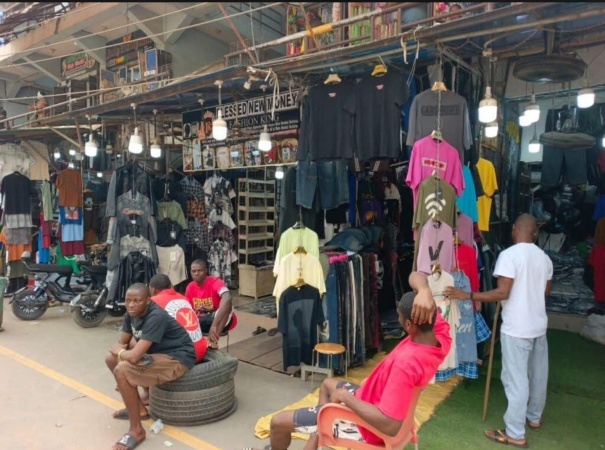

























Loading banners


NEWS EXPRESS is Nigeria’s leading online newspaper. Published by Africa’s international award-winning journalist, Mr. Isaac Umunna, NEWS EXPRESS is Nigeria’s first truly professional online daily newspaper. It is published from Lagos, Nigeria’s economic and media hub, and has a provision for occasional special print editions. Thanks to our vast network of sources and dedicated team of professional journalists and contributors spread across Nigeria and overseas, NEWS EXPRESS has become synonymous with newsbreaks and exclusive stories from around the world.

A sweeping review of various licensing fees paid by clearing agencies and bonded terminals may constrain capacity utilisation in the maritime value chain, which is already strained by falling importation.
The changes could also trigger mass job losses and undermine the N3.5 trillion investment in the already deprived indigenous bonded warehouses and terminals, it has been learnt.
In Lagos and Ogun states alone, there are about 40 bonded terminals caught in the new licensing regime. With each employing at least 350 individuals, 14,000 Nigerians risk job losses if the firms, which are already operating at little or no margins, close operations. Newspaper subscription bundles
The Nigeria Customs Service?s (NCS) new licensing structure fees for port operators could also stall the $15 billion yearly turnover of the ship chandling business and ?hand? it over to foreign cartels, analysts have also warned.
Whereas the affected operators are yet to come up with a decision, the fee review announcement could rattle the industry in the weeks, has been learnt.
The implementation of the planned review of licensing fees for port operators, scheduled to take effect from January 2026, will also have importers pay more, especially in service charges imposed by agents and chandling charges at the terminals ? a possibility that would worsen the already-high costs of importation.
Industry players warned that the move could disrupt trade flows, deepen inflation, worsen congestion at the ports, and consolidate market control in the hands of a few large, strong financial firms. Newspaper subscription bundles
In the copy of the rates made available to The Guardian, the proposed increased rate for issuing of fresh licenses for clearing agents/agencies is N10 million from the previous rate of N515,000, which is a 1,842 per cent upward review.
Existing agents will also need to cough up N4 million yearly for licence renewal. The amount is over 750 per cent above the current N215,000.
For bonded warehouses, the proposed increased licensing rate is N20 million, a 33,233 per cent increase from the subsisting N60,000 fee. Renewal rate has also moved up from N60,000 to N10 million.
The NCS also proposed a N2 million increase in licensing fees for shipping chandlers from the previous N515, while for renewal, it is N1million from N515.
Also, the NCS has proposed an increase in the bank bonds for clearing agents, raising it from N350,000 to N20 million. Bonded warehouses will also no longer pay N50 million but N500 million, while ship chandlers? charges are raised from N350,000 to N2 million.
The Comptroller General of NCS, Bashir Adeniyi, had on Thursday, August 7, 2025, held a high-level stakeholders? engagement on the planned review of the licensing fees and renewal rates at the Customs headquarters in Abuja, ahead of the planned implementation.
Industry operators warned that with cargo volumes already down, additional financial pressures on the struggling freight forwarding and clearing firms would accelerate industry retraction, paving the way for market dominance by a few financially stronger players, particularly foreigners and cartels.
According to the analysts, this could slow cargo clearance processing, create bottlenecks, increase storage charges and potentially worsen congestion at the already overburdened ports.
There is also fear that the move will undermine both trade facilitation and economic stability in the maritime sector as importers will be faced with increased terminal chandling charges at bonded warehouses, which often exceed those at the mother seaports.
While a container handling charge may be within N150,000 to N180,000 at bonded warehouses/terminals, it costs about N220,000, a difference of between N40,000 and N70,000 per container.
Also, in the ship chandling operations, while some operators do not service one ship all year, because most vessels arrive in Nigeria fully stocked with victuals. And with vessels also going to other African countries for chandling services, Nigeria loses an estimated $15 billion in turnover potential yearly in chandling activity. Newspaper subscription bundles
Also, the proposed hike in licensing rates could see about 80 per cent of bonded warehouses/terminals shut down, thereby putting thousands of jobs at risk and endangering over N3.5 trillion in indigenous investment, relevant stakeholders have said.
The President of the African Professional Freight Forwarders and Logistics of Nigeria (APFFLON), Frank Ogunojemite, who was part of the meeting, told The Guardian that while the NCS?s push for modernisation and improved service delivery is commendable, increasing licence renewal and new issuance fees amidst ongoing economic hardship could have unintended consequences for the industry.
Ogunojemite said without strategic stakeholders? support, phased implementation or offsetting relief measures, the fee adjustment risks deepening financial burdens on agents, importers and consumers.
He explained that in the end, all the additional costs on imports and exports would be passed to the end-users, fuelling inflation further. Newspaper subscription bundles
The Chief Executive Officer of Globjoy Investment Limited and Public Relations Officer of the Tin Can Chapter of the African Association of Professional Freight Forwarders and Logistics of Nigeria (APFFLON), Clinton Okoro, also warned that the review could cripple smaller operators, inflate trade costs and push many licensed customs agents out of business.
?How can you talk about N4 million to renew a licence when service charges per container barely leave agents with N50,000 to N100,000 profit, and that?s if you even get jobs regularly in today?s low import market. Even the current N215,000 is high. We have been asking Customs to extend license validity to two or four years, not raise it to the ceiling,? Okoro lamented.
Okoro also flagged parallel cost increases in bonded warehouse operations, including higher handling fees and additional charges linked to transshipment, which is the process of moving cargo from mother seaports to inland bonded terminals.
According to him, moving a container from Tin Can or Apapa seaports to a bonded terminal can cost between N300,000 and N400,000 in transaction fees alone, which the importer and agents bear.
He further stated that at bonded terminals, handling charges often exceed those at the mother seaports, noting that while a container handling charge at the seaports may be within N150, 000 to N180,000, bonded warehouses/terminals cost about N220,000, a N40,000 to N50,000 difference per container.
Okoro explained that if licensing fees, bonded warehouse fees, and shipping company charges all go up simultaneously, it will make clearing goods economically unviable for many operators.
The National President of the Nigerian Licensed Ship Chandlers Association, Dr Martin Enebeli, criticised the proposed increase in the yearly license renewal fees for chandlers, warning that the move would deepen poverty in the sector without addressing its structural deficiencies.
Enebeli argued that the proposed hike is unjustifiable given that Customs does not allocate vessels to indigenous chandlers, leaving many without a single contract in an entire year.
?Some chandlers do not service one ship all year because most vessels arrive in Nigeria fully stocked with victuals. You want them to pay N2 million for a license when there is no guaranteed business? It is null and void,? he said.
Enebeli noted that the Nigerian Ports Authority (NPA) already charges chandlers about N50,000 yearly for port access, yet there are no policies mandating vessels to procure ship stores locally. Newspaper subscription bundles
He added that imposing a N2 million license fee in addition to existing costs, such as NPA?s $50,000 yearly port access and high compliance expenses, would push many chandlers out of business.
?If there were a regulation requiring every vessel to take at least $2,000 in victuals per voyage from Nigerian suppliers, it would make sense to review fees. But without vessel allocation, the hike only worsens poverty in the sector,? Enebeli said.
According to him, Nigeria loses out on an estimated $15 billion turnover potential yearly from chandling, supply of ship stores, spare parts and provisions, because most vessels calling at the country?s ports source their supplies abroad, particularly from Togo, Benin, Ghana, C?te d?Ivoire, Cameroon and South Africa.
He cited international models such as the United States? Jones Act, which mandates the use of domestic suppliers for certain ship provisions and similar practices in Black Sea countries, as examples Nigeria should emulate.Newspaper subscription bundles
According to Enebeli, the essence of chandling regulation should be to create business opportunities for indigenous operators to compete with their counterparts in other maritime countries and not to impose higher fees without enabling market access.
He urged Customs and other maritime agencies to rethink the fee hike and instead develop policies that guarantee indigenous chandlers access to vessel contracts across upstream, midstream and downstream segments, including offshore operations, FPSOs, LNG carriers and cabotage vessels, without shrinking the pool of operators.
?If the government truly wants to boost revenue and create jobs, it should prioritise indigenous participation in chandling and enforce minimum local supply requirements. Otherwise, the licence increase will only drive operators out of business,? Enebeli said.
The Managing Director of Harsecom Logistics Limited and General Secretary of the Association of Bonded Terminal Operators (ABTO), Haruna Omolajomo, said many bonded warehouses are operating at less than five per cent capacity, with some already shut down.
He warned that the review could put over 65 per cent of operators out of business immediately, with their billions in private investment, while triggering widespread job losses in the maritime logistics chain.
According to him, the sector has already been hit by a Customs directive barring used goods, pharmaceuticals and reefer containers from clearance at bonded facilities, along with many concessionaires and shipping companies who have also restricted container flows to the terminals.
He said, faced with shrinking cargo volumes, many operators are servicing bank loans, paying salaries and meeting multiple statutory obligations to agencies such as NPA, NIMASA and NIWA.
Omolajomo said the proposed licensing regime would require bonded terminal operators to deposit as much as N500 million as a bank deposit or bond, in addition to sharply higher licence renewal fees, making it impossible for most operators to evade closure.
Omolajomo warned that if implemented without review, over 65 per cent of bonded warehouses and terminals would close, with the figure potentially reaching 80 per cent in the long run.
According to him, in the Lagos?Ogun axis alone, there are more than 40 bonded facilities, each employing about 350 direct staff and over 1,000 indirect workers.
He expressed fear that the collapse of smaller operators would pave the way for foreign concessionaires, shipping lines and other deep-pocketed interests to take over the sector, undermining Nigeria?s local content policy. Newspaper subscription bundles
Operators warned that the combined effect of higher license costs, restricted cargo flows, rising loan repayments and multiple statutory charges from agencies, including NPA, NIMASA, and NIWA will push many into insolvency.
They warn that foreign entities, concessionaires, and even criminal networks could take control of surviving facilities if indigenous operators are forced out.
?Every additional cost will be passed down the chain. What you buy today for N1,000 could soon cost N6,500. This is not just a maritime issue; it is a national inflation issue,? Omolajomo warned.
Following the presentation of the new rates by the Deputy Comptroller General (DCG) Tariffs and Trade, Caroline Niagwan, representatives from various associations rejected the proposed rate but agreed to take the matter back to their respective organisations for further discussion and to reconvene in two weeks.
Meanwhile, the Customs boss said the review was in line with the statutory mandate under Sections 103 to 107 of the Nigeria Customs Service Act, 2023, and in furtherance of ongoing reforms to strengthen professionalism and regulatory efficiency in the freight forwarding sector. Newspaper subscription bundles
The National Public Relations Officer and Assistant Comptroller of Customs, Dr Abdullahi Maiwada, in a statement issued, said the planned review is intended to reflect prevailing economic realities, including the value of exchange rates, address operational demands, and ensure that only agents who meet the service?s compliance, competence, and integrity requirements continue to operate within the system.
The service noted that this initiative is aimed at promoting accountability, streamlining processes and enhancing the quality of service delivery in the sector, as licensing of operators remains a critical component in safeguarding the integrity of Nigeria?s cargo clearance process.
The NCS emphasised that the review forms part of broader modernisation efforts targeted at repositioning it to meet the evolving needs of international trade and border management.
?It is expected to create a more transparent, predictable, and efficient licensing regime that will ultimately benefit legitimate operators and the trading public. The new licensing structure is scheduled to take effect from January 2026, following the conclusion of stakeholder consultations,? the service stated.
The NCS reassured stakeholders of its commitment to an inclusive process and noted that feedback from industry associations, individual operators, and relevant government agencies will be carefully considered before the finalisation and implementation of the review.
The service reiterated its dedication to fairness, transparency and the promotion of a secure, competitive and efficient trading environment in the country.
Already, the NCS has banned bonded terminals from handling the clearance of pharmaceutical imports in a bid to tackle the influx of substandard and unregistered pharmaceutical products into the country.
The Service also revoked the licenses of some bonded terminals allegedly used for importing and clearing dangerous and prohibited goods. The Sea Empowerment and Research Centre (SEREC) had, in one of its weekly bulletins, stated that the menace of smuggling and revenue evasion is perpetrated by sophisticated networks of cartels and syndicates, whose illicit activities have been sustained by insider trading networks within ministries and regulatory agencies.
The research body stated that bonded terminals have become a conduit for smuggling activities, with investigations revealing that illicit drug syndicates partner with local accomplices and customs licensed agents to establish bonded terminals, increasing the rate of drug trafficking in Nigeria.
However, the Service rolled out compliance-driven incentives with the new licensing fee structure for operators, which includes unlimited access to premium facilitation measures, including faster processing timelines, improved engagement channels with Customs officers and enhanced integration with the Service?s upgraded digital platforms.
According to the NCS, this incentive is designed to encourage adherence to professional standards while discouraging sharp practices. (The Guardian)